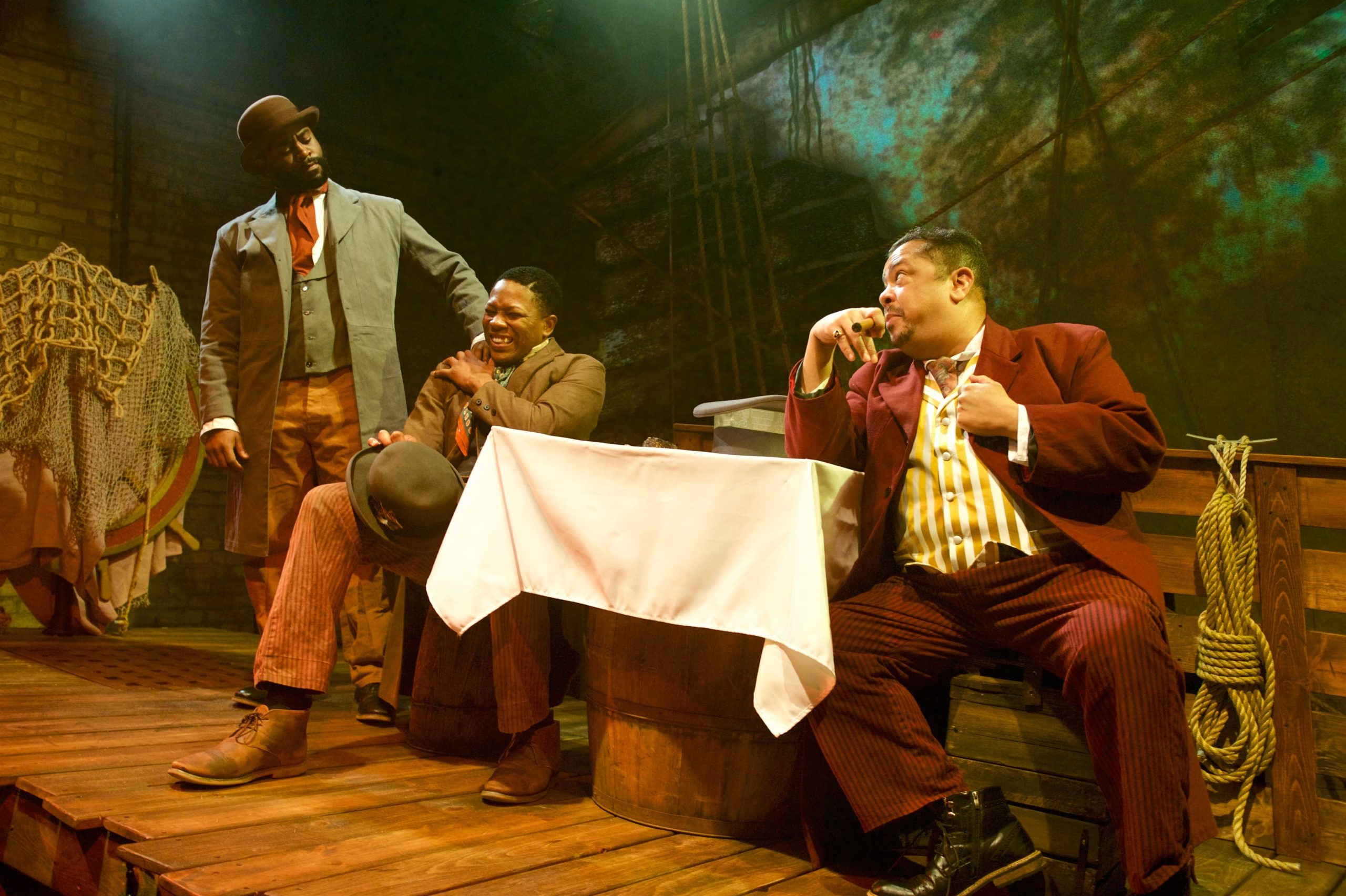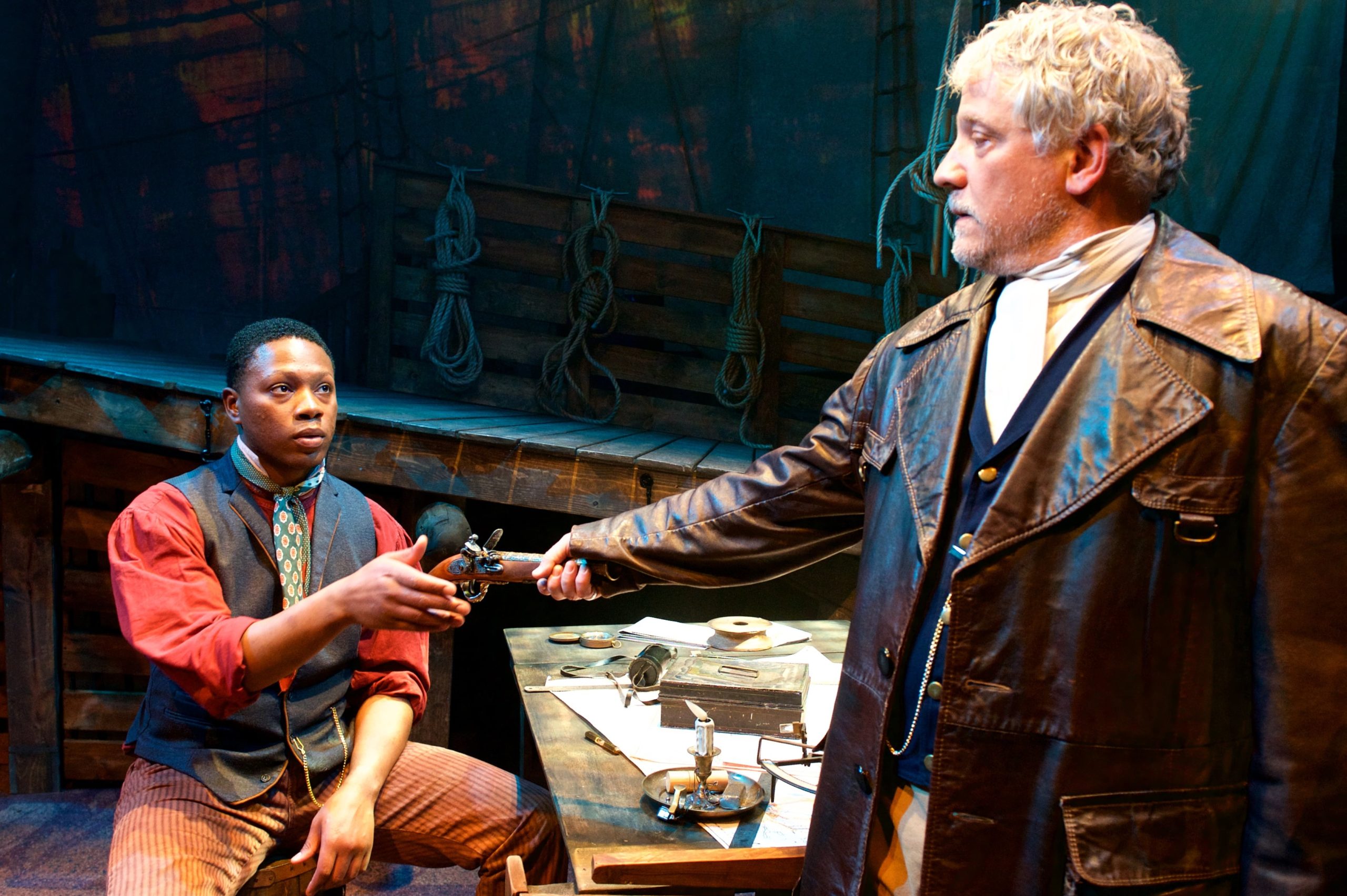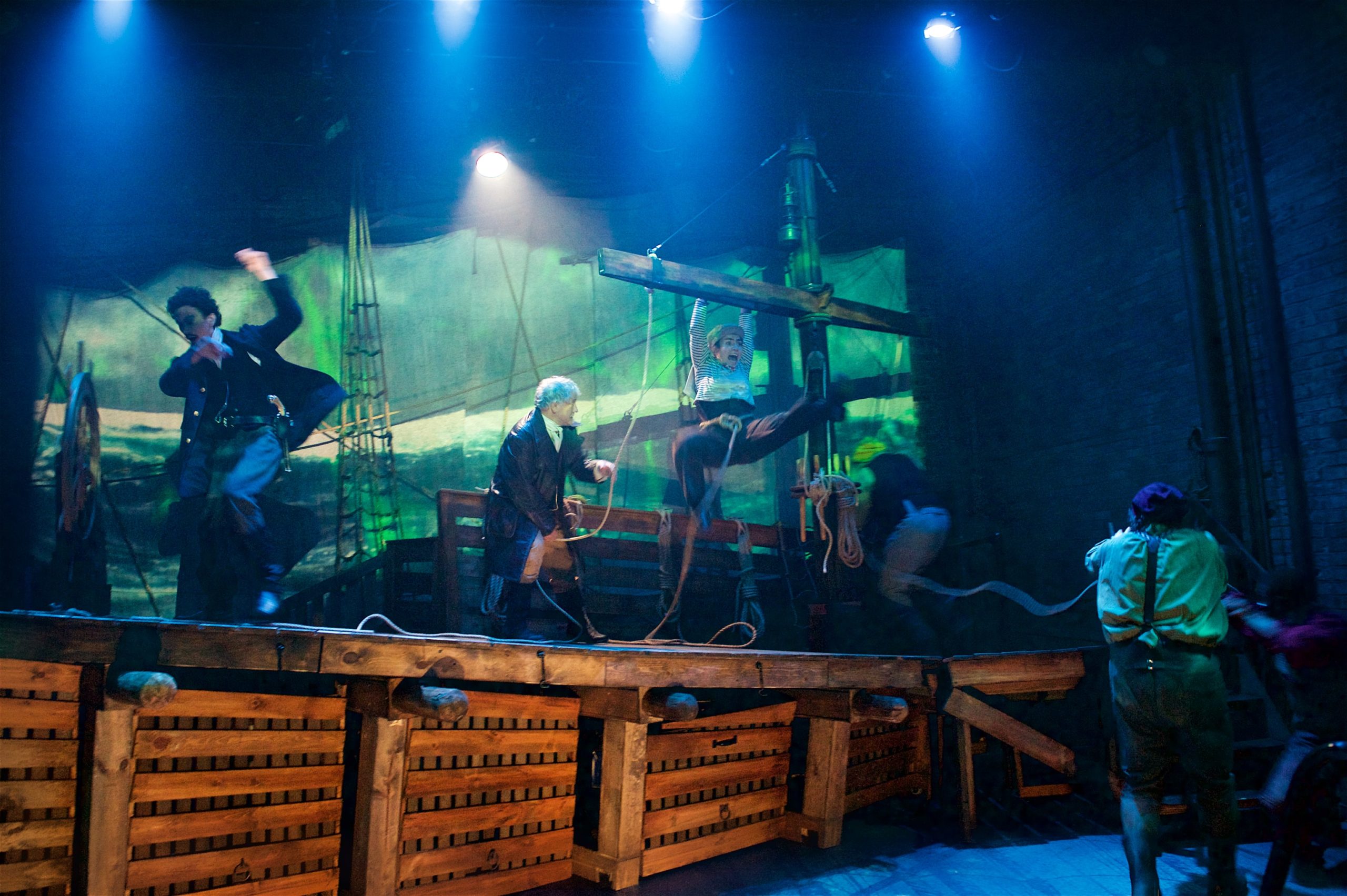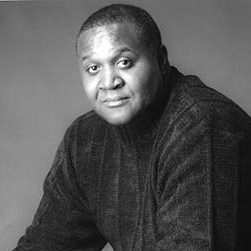From the Chicago Theatre Review
‘An Episodic and Doomed Voyage’
April 26, 2022
By Colin Douglas
RECOMMENDED
Returning to the Lifeline Theatre for its 39th season, after the pandemic shut down the world, is like coming home again to old friends. This is a special place where adaptations of great literature for both young and old comes alive. For Lifeline’s reopening we resume our 2020 voyage on their much-acclaimed production about a dark chapter in American history. Winning the 1990 National Book Award for Fiction, Dr. Charles R. Johnson’s novel is a sprawling, two-and-a-half hour dramatic saga about a young man, a freed African-American, who comes to understand firsthand the horrors of the slave trade. Co-adapted for Lifeline Theatre by Ilesa Duncan and David Barr III, this maritime adventure is a tale of self-discovery and growth, detailing a young African-American’s journey toward maturity.
After leaving his native Illinois, cocky Rutherford Calhoun heads to New Orleans, where he intends to sow his wild oats amidst the decadence of the Big Easy. After arriving, he meets an enchanting, but prim and proper young schoolteacher named Isadora Bailey. Calhoun charms the young lady, but Miss Bailey isn’t easily wooed by Rutherford’s sweet talk. She wants a commitment, so Isadora tries to blackmail Calhoun into marrying her if she’ll pay off his debts. To avoid the confinements of marriage, Rutherford stows aboard a sailing ship. What he doesn’t realize is that the Republic is a slave ship bound for the African coast on its mission to capture dozens of men, women and children who’ll be ripped from their homeland and sold into bondage.
Rutherford befriends affable, heavy-drinking Josiah Squibb and becomes his galley assistant,. He also comes to like and deeply respect the Republic’s honorable and trustworthy First Mate, Peter Cringle. But, like the rest of the crew, Calhoun fears the ship’s tyrannical captain, Ebenezer Falcon, despite being taken into the brutal autocrat’s confidence and becoming his eyes and ears above deck. Dr. Johnson’s story takes the audience on a complicated, episodic and doomed voyage to the west coast of Africa, and beyond.
Along the way, Rutherford must overcome a number of challenges. Calhoun learns to balance an edgy relationship with the lunatic ship captain with a dissenting crew who continually threaten to mutiny. He also crushes all the fear and hatred thrust upon him by the Allmuseri captives, who are chained below deck. The valiant young man manages to survive a violent storm at sea that kills most of his shipmates and destroys the ship. Rutherford is eventually rescued by another ship and, upon returning to New Orleans, he finds Isadora and his creditor, Papa Zeringue. Following so many months of danger, Calhoun has learned empathy. His compassion for his fellow man and the importance of settling down to a wife and family finally become his life goal. Ultimately, Rutherford Calhoun’s story ends happily.
This theatrical adaptation is one of Lifeline Theatre’s more ambitious and complicated dramas. Kudos to director and co-adaptor Ilesa Duncan for keeping all her ducks in a row and helping the audience to navigate this difficult, labyrinthine tale of the high seas. Johnson’s story is complicated, but captivating and unique, especially with its African-American hero. The play presents a seldom-seen, sometimes misunderstood dark chapter in American history. The production is beautifully enhanced by a host of gifted, unseen talent. This includes a magnificent, impressively functional scenic design, by Alan Donahue; a palette of ever-changing, mood-enhancing lighting, co-created by Kyle Bajor and Scott Tobin; sound and music designs by Barry Bennett and Shawn Wallace, respectively; and some incredible, moving projections, that bring the rolling waves and furious storm into this intimate venue, designed by Alex Gendal. Anna Wooden’s authentic period costumes put the icing on the cake. This is an incredible technical achievement for this literary-inspired theatre company.
The eleven talented, flexible actors who bring this story to life have got to be some of the hardest-working performers around. All the performances are solid and well-executed. As Rutherford Calhoun, charismatic actor Ajax Dontavius is terrific full of energy. Sometimes, however, the actor’s enthusiasm makes it difficult to understand what he’s saying. He needs to slow down and remember that he’s telling a story that’s new and unfamiliar. Seldom if ever leaving the stage, Mr. Dontavius is the heart and soul of this epic story, taking the audience along with him on his journey of self-discovery and personal growth. We come to identify with Rutherford Calhoun’s odyssey toward enlightenment.
He’s aided by a cast of excellent supporting actors. Robert Koon is funny and often touching as Josiah Squibb; the always impressive Christopher Vizurraga brings sobriety, class and stature to his portrayal of First Mate, Peter Cringle; Patrick Blashill is forceful and fearsome, returning once again to play Captain Falcon. Gerrit Wilford, as McGaffin, lends his combat skills to the action and a powerful singing voice to the melodic sea shanties that help create atmosphere; Shelby Lynn Bias once again makes a sweetly sophisticated Isadora Bailey; Kellen Robinson displays strength and versatility playing Tom, the cabin boy; Linsey Falls is filled with ominous strength, as Papa Benjamin Jenkins makes a threatening character in Santos; Monty Kane portrays intelligence and is wonderfully commanding, as both Jackson and Ngonyama; and MarieAnge Louis-Jean makes and innocent and touching little Baleka. All of the actors double and triple as the townspeople, the ship’s crew and/or the African captives, making this cast so impressive.
This adaptation of Charles Johnson’s award-winning epic historical novel of the sea is a bit too long and could use some judicious trimming. But the story is a perfect offering for this literary-based company. The play is an intricate, episodic tale of a young man’s journey toward maturity that requires careful attention by the audience. Lifeline Theatre’s brilliant cast and crew, under the tight direction of Ilesa Duncan, work diligently to make this chapter of history come alive. Together they bring this unbelievable adventure to the stage with polish and panache. For the savvy theatergoer, however, despite the length of the play, the journey toward discovery is worthwhile.
From Splash Magazine
‘A Multi-Layered Epic Adventure’
April 28, 2022
By Fran Zell
HIGHLY RECOMMENDED
Like the celebrated novel it is based on, Middle Passage which opened this week at Chicago’s Lifeline Theatre, is a multi-layered epic adventure that questions the meaning of freedom and the way we live together. Building on the tradition of African American storytelling, the play—like the book, written by MacArthur Fellow Charles Johnson—addresses racism, classicism, and poverty, issues that are as critical now as they were nearly two centuries ago in the slave-stained era in which the story takes place.
This is a powerful and imaginative production, directed by Ilesa Duncan, who co-wrote the adaptation with David Barr III. Duncan and Barr won a Jeff nomination for their adaptation back in 2016 when the play premiered with Pegasus Theatre Chicago, then titled Rutherford’s Travels. As Middle Passage, it had a truncated production with Lifeline in 2020 due to Covid lock downs, and is now up and running with full force and a slick set design that can connote the excitement of a full-rigged ship at sea.
The story centers Rutherford Calhoun (Ajax Dontavius), a young, newly freed slave from Illinois. He leads us through a world of corruption and cruelty beginning in 1830 New Orleans, where his new life is good until it isn’t. Unable to find work, he runs afoul of gambling den creditors despite his self-proclaimed propensity for stealing. He is a rogue, but a charming rogue, and easily forgivable, especially in light of the much greater, state-sanctioned crimes being committed all around him.
Isadora Bailey (Shelby Lynn Bias) is a high-minded schoolteacher from a Boston family freed from slavery for generations. She loves Rutherford , but wants to gentrify him, and can’t accept that he doesn’t love her. She schemes to keep him out of prison by paying his debts, but only if he marries her and so the creditors prepare to carry Calhoun to the altar.
Rutherford sees that option as another prison sentence and escapes on the first ship out of town, the Republic, unaware that it is a slave ship “My God,” he exclaims the first time he witnesses the savagery with which captive men, women and children are treated on board. “How can I go on after witnessing this?”
This is perhaps the central question of the play as originally posed in Johnson’s National Book Award winning and bestselling novel. First published in 1990, the book brought attention to barbaric practices on slave ships during the part of the journey known as the Middle Passage.
The term reflects the concept of a triangular trade route in which ships left the New World with commodities like hides, tobacco, sugar and rum, exchanged them in Europe for money and manufactured goods that were then used to purchase slaves in Africa, who were shipped to the Americas and exchanged for commodities that were once again shipped to Europe, ad infinitum repeating a process that spanned 400 years and accounted for the tortured deaths of at least two million people. That toll is roughly 10 to 20 per cent of the estimated 12.5 million people who were trafficked from Africa, all of them shackled, and stacked like so much cordwood in the dark, airless holds of the ship. Some two million more would die from horrific lives under slavery.
This historical truth provides context to a fictional tale of a hapless ship populated by the tyrannical Captain Falcon (Patrick Blashill), a mutinous crew, and a mystical clan of African captives called the Allmuseri. Rutherford can’t decide whose side he’s on, tumbling back and forth between loyalties. He’s as storm-tossed as the sea that is so ably depicted in this intimate theater space via lighting, sound, projections, and other design/production team magic.
“I don’t know who is right or wrong,” Rutherford says at a moment when it is impossible to know who is perpetrating what violence on whom. “I just want to keep everyone alive.”
Everyone doesn’t stay alive. But lessons are learned and driven home by a frightful Allmuseri deity who the Captain has smuggled on board under the delusional belief that even gods can be bought and sold.
There is so much to praise in this tightly-wound show, starting with Dontavius who plays Calhoun with just the right balance of brash energy and wide-eyed uncertainty, helping to hold all the disparate plot points together. Other noteworthy performances are delivered by Bias, Blashill, Christopher Vizurraga as Peter Cringle, the first mate who questions slavery, and Linsey Falls as Papa Zerinque, underworld boss and traitor to his own people.
From TotalTheater
April 26, 2022
By Mary Shen Barnidge
HIGHLY RECOMMENDED
Passengers traveling on ocean vessels are, literally, unmoored, rendered utterly bereft of any fixed point by which to orient themselves (unlike the illusion of equilibrium an airplane’s floor offers). When every perception, waking or sleeping, becomes unfamiliar and, therefore, fraught with possibility, those struggling for a foothold in the nebula of nature’s uncertainty can come to accept phenomena unimaginable on land—an ancient tribe of African sorcerers, for example, or a mysterious deity capable of blasting the senses of mortals.
Charles Johnson’s epic historical novel Middle Passage integrates themes from Moby Dick, Huckleberry Finn, Gulliver’s Travels, Heart of Darkness—virtually every nautical yarn in western literature: our story begins circa 1830 when free-Black hustler Rutherford Calhoun flees New Orleans aboard a ship preparing to cross the Atlantic, only to discover that its destination is Africa, its cargo on the return voyage comprised of captive natives to be sold as slaves and its captain indifferent to human compassion for all living creatures, including his own crew. When good and bad, right and wrong, friend and foe swirl together like the ever-shifting sea, where is a person to anchor his allegiance?
Ilesa Duncan and David Barr III have put the recent two-year suspension to good use, paring away extraneous text in this third-time adaptation (the first appearing in 2016, and the second just before the theaters closed in 2020) to facilitate the action progressing at swifter velocity. To be sure, this concession to audiences of short attention spans is not without its price in terms of the copious densely textured narrative required to encompass Johnson’s multicultural perspective, but more playgoer-friendly devices—R & D Choreography’s contrasting fight techniques employed in a brief scuffle, or the Lifeline techs’ rip-snorting storm at sea—succeed in conveying any necessary information missing from earlier drafts.
This expertise is manifested most skillfully in Shawn Wallace’s original incidental score—first introducing us to Rutherford in a spoken-word soliloquy with the refrain “I’m so glad I’m free” then later reprised in a significantly different tone reflecting the wisdom acquired by our hero’s experience.
From Buzz Center Stage
‘LIFELINE RESUMES RUN ‘MIDDLE PASSAGE’ EVEN BETTER THAN BEFORE’
April 29, 2022
By Bill Esler
HIGHLY RECOMMENDED
Lifeline Theatre has remounted ‘Middle Passage’ for its return to live production. It is every bit as good, even better, than the run cut short by the pandemic in March 2020.
But this time around I was able to to appreciate the artfulness of the script. Adapted by Ilesa Duncan (who co-directs with David Barr II) from a best-selling National Book Award winning novel by scholar Dr. Charles Johnson. Middle Passage the book is a fictional first-person narrative set in 1830 by a 20-year-old freed slave, Rutherford Calhoun (Ajax Dontavius), who makes his way from Southern Illinois to New Orleans to sow his wild oats.
It is an exciting show: absolutely entertaining, well-produced, extremely and well-acted. It would have been a crying shame if audiences didn’t get another chance to see the inventive staging, a realistic ship’s deck crammed into Lifeline’s compact quarters at 6912 N. Glenwood in Chicago. It runs through June 5 so don’t miss it.
Entertaining as it is, ‘Middle Passage’ also depicts the enslavement and transport of Africa’s Allmuseri people, their inhumane treatment by a cruel ship’s captain, and plans by the captain to sell their most sacred possession, a statue of a living god kept stowed with the slaves below. How do these opposites co-exist in one play? Sadly, just as they do in daily life.
Ajax Dontavius as Rutherford Calhoun carries the weight of the show, onstage nearly every minute, and he acquits hiimself exceptionally well as the wandering young man. Like a 19th century literary character (think Thackeray’s Barry Lyndon), the script recounting his experiences from Calhoun’s first-person point of view. As the good and bad pass before his eyes during his adventures, he makes frequent asides to speak directly to the audience—really very Shakespearean, with some of these in metered rhyme. As in life the lighthearted moments and the tragic co-exist, and at first, Calhoun drifts through them all, witnessing but unaffected.
Calhoun is on the make in New Orleans, and without means – courting young ladies, but also running up debts. This comes to the notice of Papa Zeringue (Lynsey Falls is excellent), a Creole mob boss holding 50,000 francs in Calhoun’s promissory notes. Papa Zeringue tells Calhoun he must pay, or he will be thrown into the deeps of the Mississippi.
Thankfully for Calhoun, he has won the heart of the chaste school marm, Isadora (Shelby Lynn Bias is superb in the role), a very refined young Black schoolteacher from Boston, whose family has been free four generations. Isadora has some savings, and unbeknownst to Calhoun, negotiates to pay his debts to Papa Zeringue, on the condition Calhoun is forced to marry her.
Calhoun is not interested in marriage, and so escapes by stowing aboard the ship Republic. Discovered days after it puts out to sea, he joins the crew, but soon learns the Republic is an illegal slaver, on its way to Africa to pick up human cargo. And with that, the story opens to an exciting, rollicking seafaring tale with all the trappings—storms, cannon fire, mutiny, betrayals, culminating in a shipwreck following a slave rebellion. Here as my companion noted the blocking is remarkable, the tiny stage presenting a shipp tossed on the sea, conveyed by the carefully orchestrated movements of the crew and cargo tossed to and fro.
Calhoun is there for selfish reasons – “Of all the things that drive men to sea, the most common disaster, I’ve come to learn, is women” – as one character puts it. As an “everyman” character, we watch Calhoun try to avoid dirtying his hands in a mutiny, and later negotiating with the slaves who seize the ship. But Calhoun changes through his experience, befriending the slaves and shifting from aloof observer to their advocate. convincing the slaves to spare the helmsman who alone can guide them back to their homeland. Calhoun develops his moral compass through the trials, and as my companion suggests, is like the hero in the tale of Gilgamesh, back where he started as the boat finally returns to port in New Orleans, but a changed man, and a beautiful resolution of the series of plot points follows.
In addition to Baily and Dontavius, the cast is uniformly good – really good – and most play multiple ensemble roles, as well as their principle character: Hunter Bryant (Calhoun’s brother Jackson), also, notably plays the role of a young slave learning English who bonds with Calhoun. All the players are good: Patrick Blashill (Captain Falcon) and Christopher Vizurraga (Peter Cringle); Benjamin Jenkins (Santos), Monty Kane (Jackson/Ngonyama), Robert Koon (Josiah Squibb), MarieAnge Louis-Jean (Baleka), Kellen Robinson (Tom), and Gerrit Wilford (McGaffin).
The production team are also stars, kudos to Alan Donahue (Scenic and Properties Designer), Elise Kauzlaric (Dialect Coach), Maren Robinson (Dramaturg); Amelia Ablan (Production Manager), Noah Abrams (Master Electrician), Kyle Bajor (Co-Lighting Designer),, Barry Bennett (Sound Designer), Connor Blackwood (Assoc. Sound Designer), Alex Gendal (Projections Designer), Galen Hughes (Asst. Stage Manager), Harrison Ornelas (Technical Director), Nicole Clark Springer (Choreographer/Movement Designer), Mattie Switzer (Stage Manager), Scott Tobin (Co-Lighting Designer), Shawn Wallace (Composer/Music Director), and Anna Wooden (Costume Designer).
Alan Donahue’s is a lovingly crafted sailing vessel with multiple decks, stowage, working winch, mast and beam – all integrated to the projection design and sound design makes us feel for all the world we are at sea, particularly during storms and battles.
The play originated at Pegasus Players in 2016 as ‘Rutherford’s Travels.’ But this version seems very strongly rooted in African storytelling culture, which taps a type of magical realism, to my mind (like Colson Whitehead’s Underground Railroad). Its title is far more resonant today: Middle Passage, the slave shipping route that represents the crucible of emotional and spiritual transformation from free, cultured Africans to impoverished American slaves.



































